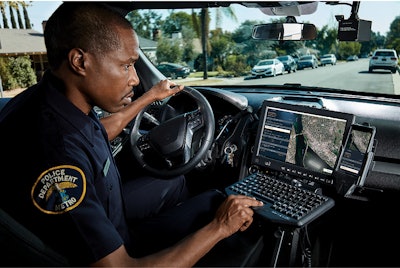 Samsung DeX allows agencies to connect phones to external keyboards and displays to create a mobile computer solution. (Photo: Samsung)
Samsung DeX allows agencies to connect phones to external keyboards and displays to create a mobile computer solution. (Photo: Samsung)
Many law enforcement officers are now carrying personally owned or department-issued smartphones—handheld computers—that have as much processing power and software versatility as the desktop and laptop machines they use on the job. The reasons phones are now rivaling police computers in power are simple: Cash-strapped agencies sometimes wait more than five years—an eternity in the high-tech market—to buy new laptops and even longer for new desktops. Also, innovation in mobile devices has accelerated much faster than innovation for conventional computers.
Exploiting the growing capabilities of the smartphone is the idea behind Samsung DeX. Short for “desktop experience,” DeX is software that turns a Samsung smartphone into a notebook or desktop computer. All of the processing power and connectivity comes from the smartphone. The rest of the system is a dock, a keyboard, and an external display.
DeX was created for industrial and business applications, but it is also finding favor with law enforcement and other public safety agencies as a replacement for in-vehicle computer systems.
Can a smartphone docked with a keyboard and an external display really replace laptop computers in police vehicles? The verdict is still out. But two of the nation’s largest law enforcement agencies, the Los Angeles Police Department and the Chicago Police Department, are currently weighing the evidence. “The smartphone is becoming more and more capable of being a standalone computer,” says Deputy Chief Sabih Khan of the Chicago PD’s Strategic Initiatives Division.
Khan says the Chicago PD is testing Samsung DeX because it offers all of the features the agency needs for its smartphone as computer program. “It offers true mobility, where officers aren’t tied to the vehicle,” Khan says. He explains that Chicago has officers who currently can’t access important information because they do not have laptops. “We have officers on foot, bikes, horses, and ATVs,”
he says.
Other reasons why Chicago chose DeX for its pilot program include the system’s capabilities for mass notification to officers and it’s built-in biometric security, which complies with CJIS. Another security benefit for using DeX is that the phone can be remotely erased if lost or stolen, preventing sensitive data from being compromised.
Khan and Lt. Dan Gomez, retired from the LAPD, recently presented a webinar on their agencies’ DeX pilot programs for Samsung. LAPD is reportedly using DeX in numerous vehicles on its way to rolling out the “Connected Officer Program” to 7,000 officers.
Chicago is currently at the beginning stages of its pilot. The program is currently limited to just three vehicles and some in-station docking systems. The testing includes evaluation of the hardware for mounting the systems into vehicles and the available displays and keyboards. Khan says the CPD’s DeX set ups are using different hardware. One of the primary issues that the Chicago PD is working on is how to best set up the system in its patrol vehicles. “[We need to determine] where do we place the phone, how to best fit the hub, open SIM/closed SIM, and cable lengths,” he says.
Software is another area of concern in the Chicago pilot. “[We need to know if] our current applications work and do they work well within the DeX environment,” Khan says. “We need to identify if it’s an issue on the DeX side or the vendor’s mobile application.”
The goal is to expand the program to all 1,200 patrol vehicles, Khan told the webinar audience. “We have to get into the game now to get there.”
The reasons for getting into the game are many, according to Khan. He believes the department will see significant cost savings on both computer hardware and IT services.
But the real benefits are the capabilities the system will give officers. The Samsung Galaxy phones the Chicago PD is planning to issue will carry more than 30 applications for helping officers in the field. Officers using DeX will be able to file reports on their phones, capture evidence on their phones, and even view live video from one or more of the city’s more than 40,000 digital surveillance cameras.
Another benefit to DeX is that the footprint of the computer system in the vehicle is much smaller that that of a conventional laptop. Both LAPD and Chicago PD run two-officer patrol units, and passenger compartment real estate is at a premium.
Gomez, who oversaw the rollout of the LAPD program, says DeX docking units inside of LAPD stations have reduced the time officers have to wait for computers so they can write up their reports. Gomez is now chief operating officer of TacLogix, a consulting company that helps agencies set up their own connected officer programs. He is working with the Chicago PD on its DeX program.
Khan says Chicago officers have been extremely enthusiastic about the possibility of using smartphones rather than laptops. “This is the only pilot where officers are asking to get involved,” Khan told Samsung. “With the younger officers, the phone has been everything to them, and they want to see this happen.”
Khan says officer feedback has been positive, but there are issues that need to be fine-tuned before the program expands. “Small but important things need to be worked out,” he says. He gives examples of CAD controls being too small and issues with minimizing and maximizing windows.” But overall he is bullish on the future of Samsung DeX at the Chicago PD and the future of smartphones as standalone computers in law enforcement operations. “This will be the future of policing,” he told the webinar audience.


